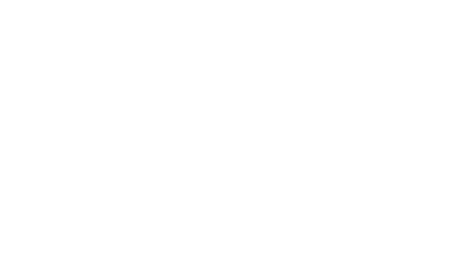Ukraine fights Euro 2012 boycott
- Published
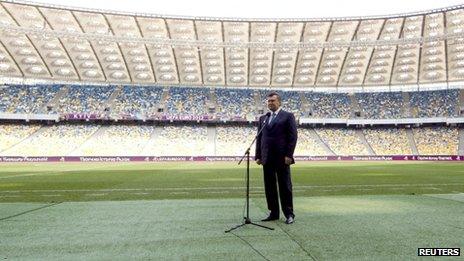
Ukraine's President Viktor Yanukovych could cut a lonely figure in the VIP box at the Olimpiysky stadium this summer
The newly overhauled Olimpiysky stadium in Kiev, listed among the world's most expensive sporting arenas, has 50 seats booked for VIP guests attending Euro 2012 matches in Ukraine.
The VIP box was supposed to seat many of Europe's leaders for the final of the tournament, scheduled for 1 July 2012, as Ukraine's President Viktor Yanukovych intended.
Now though, that luxury box seems destined to remain empty for the championship's showpiece finale.
With European leaders threatening to boycott the matches being played in Ukraine, to protest against the treatment of former PM Yulia Tymoshenko, this championship, co-hosted with Poland, has every chance of becoming one of the most politicised sporting events in decades.
Different boycott
Many political and sports observers in Kiev doubt that the threat to boycott the Euro 2012 matches will actually happen. And Ukrainian opposition leaders have urged Europe's leaders to boycott Ukraine's authorities rather than the football contest.
The leader of the opposition Front for Change party, Arseniy Yatsenyuk, Ukraine's third most popular politician after Viktor Yanukovych and Yulia Tymoshenko, urged European leaders to come to the championship but suggested they ignore the president.
"The best scenario would be if the European leaders attended the championship, but did not meet President Yanukovych. It's supposed to be a visit to Ukrainians, not to Yanukovych," he said.
Ukrainian ex-foreign minister and Tymoshenko ally Borys Tarasyuk considers it unlikely that a boycott will go ahead, as the EU does not have an official, consolidated position on the issue. The European Commission has, however, said none of its officials will attend the tournament.
European leaders are well aware that boycotting Euro 2012 would also mean ignoring the interests of thousands of fans, the former minister believes.
The Ukrainian authorities are focusing on the supporters too.
'Cold War'
While Mr Yanukovych has given no comment on the threats of European leaders as significant as Germany's Chancellor Angela Merkel to boycott the tournament, Ukraine's foreign affairs ministry has been open in its condemnation.
"Euro 2012 is sport, not politics, it's a football championship, not a political summit," said Oleg Voloshyn, the ministry's spokesman.
"Solving political problems this way means employing Cold War methods."
Diplomats say a boycott would be detrimental primarily to the millions of Ukrainians who either back other political parties or show very little interest in politics altogether.
And people posting on a BBC Ukrainian forum appear to agree that ordinary people should not suffer because of politicians.
"This boycott is not a slap for our politicians, it's a slap to Ukrainians who are looking forward to welcoming our European guests," says one contributor. "By this logic, we should boycott all significant events in the world, including in Russia, China and other countries."
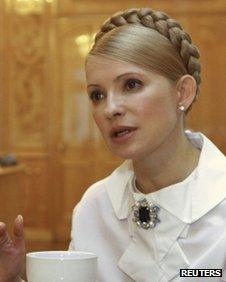
European leaders are threatening a boycott over alleged mistreatment of ex-PM Yulia Tymoshenko
"It's our politicians who should be boycotted, not the football," Ihor from Chernivsti in western Ukraine argues.
"What does Euro 2012 have to do with it? Let them ban our authorities from Europe, or suspend their accounts! Why do people have to suffer?" writes Oleksiy from Ivano-Frankivsk in west Ukraine.
'Humiliation'
Having spent $10bn on Euro 2012, the Ukrainian government feels confident the championship will take place, whatever European leaders might say.
"When we came to office, the treasury was empty, but we found money to overhaul stadiums, build airports, motorways, bridges, road junctions, repair hospitals, and now they say 'we'll boycott Euro'," Ukraine's Prime Minister Mykola Azarov complained.
"How should we take this? Who do they want to humiliate? It's a humiliation to all of us, all the people," he added.
On Wednesday, Yulia Tymoshenko was moved from Kachanivska prison to a hospital in Kharkiv, one of the Euro 2012 host cities.
The former PM gave her consent to be treated there, as long it was by German doctors.
Her transfer to hospital follows months of European pressure and a continuous argument between Ms Tymoshenko and Ukrainian officials, in whom she has little trust.
Commentators in Kiev believe this development may soften Europe's strong stand against the Ukrainian authorities. But the controversy has already caused Ukraine significant political damage, in the opinion of sports correspondent Mykola Nesenyuk.
"Kiev repeatedly emphasised that Euro 2012 would add to Ukraine's international rating. But today this goal seems unattainable, even if the contest takes place here," he told BBC Ukrainian.
- Published8 May 2012
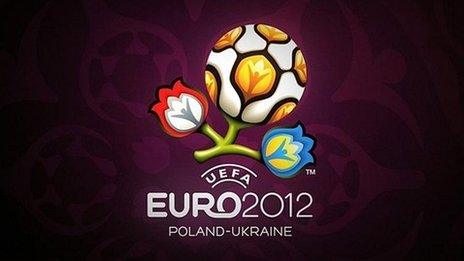
- Published3 May 2012
- Published3 May 2012

- Published3 May 2012
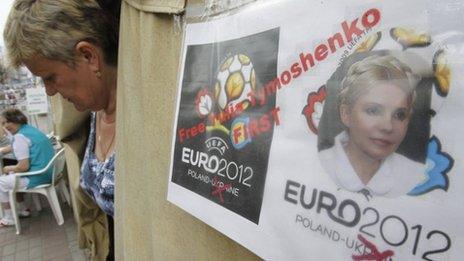
- Published23 May 2014
